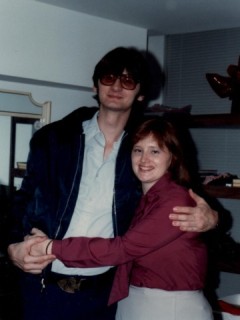|
|
|
|
“Do not wait for leaders; do it alone, person to person.” – Mother Teresa November, 2015  Recently,
my wife, Charlotte, and I were visiting our friend
Michelle, and her husband Rich, when Michelle mentioned
that she had been going through some old photographs. In
the process, she had found a picture of Charlotte and
me. We looked so young but we were clearly happy. None
of us could figure out exactly when the photograph had
been taken or whether Charlotte and I were married yet
at the time, although Charlotte described me as “scruffy
looking.” Our daughter, Monica, got a kick out of how
goofy her dad used to look. But it was a pleasant
reminder of the early years of our relationship. Recently,
my wife, Charlotte, and I were visiting our friend
Michelle, and her husband Rich, when Michelle mentioned
that she had been going through some old photographs. In
the process, she had found a picture of Charlotte and
me. We looked so young but we were clearly happy. None
of us could figure out exactly when the photograph had
been taken or whether Charlotte and I were married yet
at the time, although Charlotte described me as “scruffy
looking.” Our daughter, Monica, got a kick out of how
goofy her dad used to look. But it was a pleasant
reminder of the early years of our relationship.If you’ve been following the news, you know that an early draft the earliest ever found of the King James Version of the Bible was discovered recently at the University of Cambridge. The King James is the Bible many of us grew up with, the version with thee, thy, shalt, begat, and verily, the version that many Christians regard as the only true Bible in English. The draft was discovered by Jeffrey Alan Miller, an assistant professor of English at Montclair State University in New Jersey. Specifically, he discovered a notebook that had belonged to Samuel Ward, one of the translators of the King James Version. Until Miller rediscovered the notebook, no one even knew what it was. The find sheds light on how the KJV was translated and how the work was divided. How the discovery will impact modern Bible thought is yet to be seen but it opens a window to Christianity s past. Many years ago, long after the reign of King David, Judah had a young king named Josiah. He was only eight years old when he became king but he reigned for thirty one years. In the eighteenth year of Josiah’s reign, when he would have been about twenty six, the temple had fallen into disrepair and was being restored. During this process, Hilkiah the high priest rediscovered the scroll containing the Law of Moses. Hilkiah gave the book of the Law to Shaphan, who read it to King Josiah. When Josiah heard the words, he tore his clothes because he realized how far the people had drifted from the Law’s commands. The people were worshipping idols instead of the living God. In Revelation, John writes this to the church at Ephesus: “Yet I hold this against you: You have forsaken your first love.” (2:4 NIV). John goes on to write, “Remember the height from which you have fallen! Repent and do the things you did at first.” (vs. 5a NIV). The people of Ephesus weren’t evil, they were Christians like us. John also wrote that “I know your deeds, your hard work and your perseverance. . . . You have persevered and have endured hardships for my name, and have not grown weary.” (vs. 2a, 3 NIV). But they had fallen away from their initial zeal for Christ and were drifting along. They had forgotten how to be people of God, just as the people of Judah had forgotten. They believed all the right things intellectually; they even did the right things. But there was no passion for Christ, no passion for serving. If we’ve been Christians for a while, routine sets in. Our prayers and devotions become rote. I know mine often are. We start going through the motions. We lose our first love, our initial warmth and, in its place, we have intellectual assent. We might believe all the right things, we might even do all the right things, but there’s no passion. Paul wrote repeatedly in 1 Corinthians 13, “If I . . . but [I] have not love . . .” each time ending with “I am nothing . . . I gain nothing.” (vs. 1-3). As John Wesley wrote, the Bible gives us this remedy for the loss of our first love : [Take] these three steps, 1. Remember: 2. Repent: 3. Do the first works. If we remember our early love for Christ, repent of going through the motions, and do the works of true disciples, we can regain our passion and reconnect with our early faith. If we love God and neighbor, our worship and our witness will be vital and passionate. “Hilkiah the high priest said to Shaphan the secretary, I have found the Book of the Law in the temple of the LORD. He gave it to Shaphan, who read it. . . . Then Shaphan the secretary informed the king, Hilkiah the priest has given me a book. And Shaphan read from it in the presence of the king. When the king heard the words of the Book of the Law, he tore his robes.” (2 Kings 22:8, 10-11 NIV.) Copyright 2015 by David Phelps |